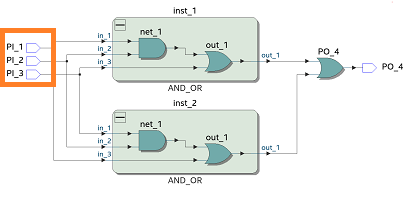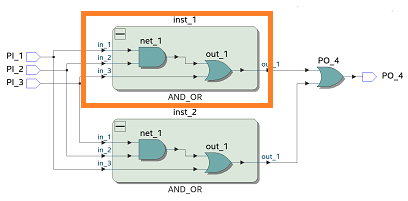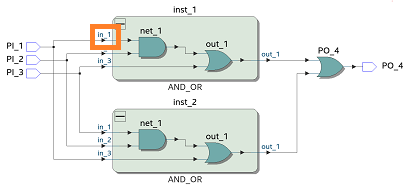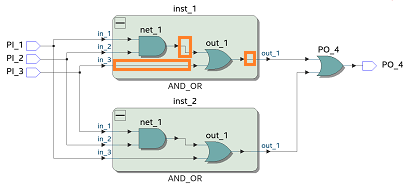Visible to Intel only — GUID: gmy1660745447238
Ixiasoft
Visible to Intel only — GUID: gmy1660745447238
Ixiasoft
1.3.2.1. Scripting Routine Tasks Using Tcl Commands
Retrieving Top-level Input Ports (highlighted in the schematic)
dni::get_ports -filter direction==input

The tcl command returns a collection of input ports in the design, such as PI_1, PI_2, and PI_3. You can use the returned collection to pass or chain into other get_object commands. To access members of the collection, use collection iterators, such as foreach_in_collection. For example:
foreach_in_collection p [dni::get_ports -filter direction=input] { puts $p }
port::top::PI_1
port::top::PI_2
port::top::PI_3
Retrieving the inst_1 Instance
dni::get_cells inst_1

The tcl command returns the inst_1 instance in the design. You can use the returned instance to pass or chain into other get_object commands. For example:
foreach_in_collection p [dni::get_cells inst_1] { puts [dni::get_property -name name -object $p] }
inst_1
Retrieving the in_1 Instance Port of the inst_1 Instance
dni::get_pins -of_objects [dni::get_cells inst_1] -filter name==in_1

The tcl command returns in_1 instance port of the inst_1 instance in the design. You can use the returned instance port to pass or chain into other get_object commands. For example:
foreach_in_collection p [dni::get_pins -of_objects [dni::get_cells inst_1] -filter name==in_1] { puts $p }
inst_port::top::inst_1|in_1
Retrieving Nets of the inst_1|out1 Instance
During connectivity trace, you may want to traverse all nets connected to an instance. In such a scenario, use the -of_objects interface of the dni::get_nets command to traverse nets connected to an instance. For example:
dni::get_nets -of_objects [dni::get_cells inst_1|out_1]

The tcl command returns nets of the inst_1|out1 instance in the design. You can use the returned collection to pass or chain into other commands. For example:
foreach_in_collection p [dni::get_nets -of_objects [dni::get_cells inst_1|out_1] ] { puts $p }
inst_port::top::inst_1|out_1|Net_7
inst_port::top::inst_1|out_1|Net_6
inst_port::top::inst_1|out_1|Net_8
Listing the Properties Available on the net Object Type
dni::list_properties -type net name parent_name number_of_ports ports net_bus_name source_file source_line is_user_declared